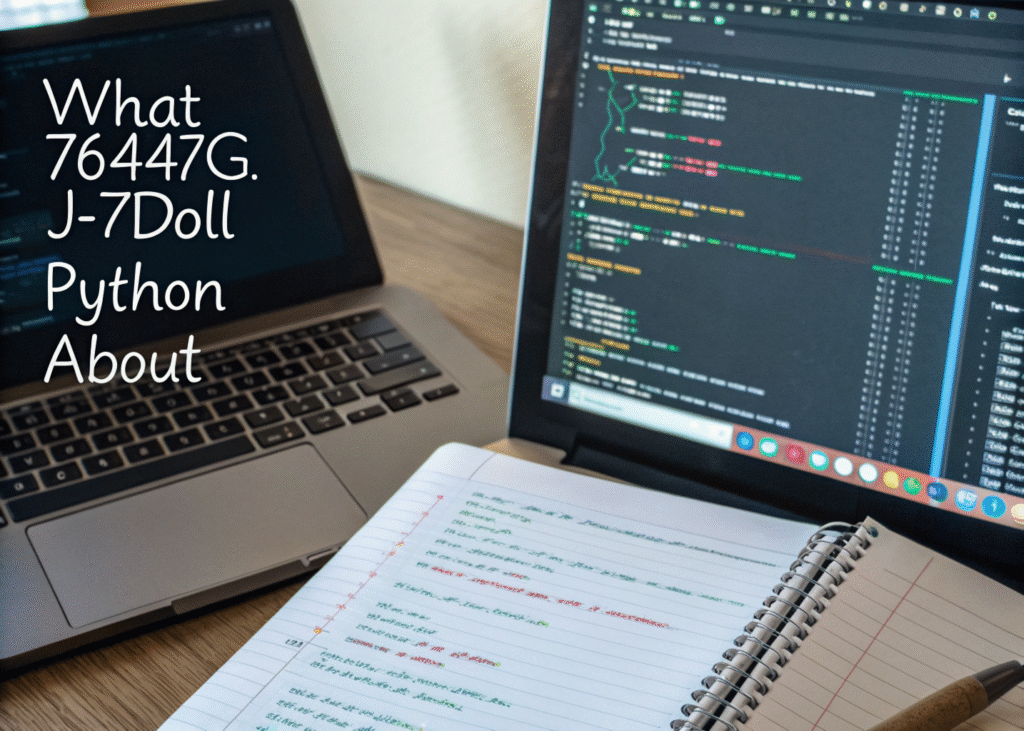Ever found a strange Python file named 7644fg.j-7doll and wondered, what 7644fg.j-7doll python about? You’re not alone. Files like this often raise concerns for developers, cybersecurity experts, and everyday users.
This file isn’t part of any known Python library. It doesn’t follow naming conventions and offers no context through its name. In most cases, such files are obfuscated, auto-generated, or even malicious. In this guide, you’ll learn what the file might be, how to investigate it safely, and what risks it could pose.
What 7644fg.j-7doll Python About and Why It Matters
The filename 7644fg.j-7doll doesn’t match any official Python module. It’s not listed in repositories like PyPI or GitHub. This alone makes it suspicious.
Files with random names like this often belong to one of the following categories:
-
Obfuscated scripts designed to hide their function
-
Temporary files generated by Python packagers
-
Malware or Trojan loaders embedded in cracked software
-
Decompiled output from reverse-engineering protected apps
This script may execute hidden code or silently communicate with external servers.
Why Would a Python Script Be Named This Way?
Obfuscation for Security Evasion
Attackers and software pirates often obfuscate file names to prevent detection. They rely on random or meaningless strings so antivirus software and users won’t easily recognize the file’s purpose. This practice also helps avoid signature-based malware detection.
Generated by a Build Tool
Some packaging tools create temporary or internal-use scripts. Programs like PyInstaller, Nuitka, or cx_Freeze can produce files with non-descriptive names when converting .py files into executables. These artifacts may not be meant for manual editing or viewing.
Decompiled or Reverse-Engineered Output
When Python bytecode (.pyc) is decompiled back into source code, original filenames may be lost. Decompilers generate default names. This could explain the appearance of something like 7644fg.j-7doll in unpacked folders.
Where You Might Find 7644fg.j-7doll
You might come across this file in:
-
Cracked software archives
-
Malware-infected zip or rar folders
-
Decompiled app directories
-
Game mod files or hacking toolkits
-
Suspicious USB devices or downloads
These files are rarely distributed openly by trusted developers.
Signs That the File Might Be Harmful
Not every unknown script is malware. But several warning signs raise suspicion. Watch for these behaviors:
| Behavior | Risk Level |
|---|---|
| Encoded strings (base64, hex) | High |
Use of exec() or eval() |
Very high |
Imports socket, os, subprocess |
Critical |
| Reads or writes system files | High |
| Sends data to external servers | Critical |
How to Safely Inspect 7644fg.j-7doll
Never open or execute a suspicious file directly on your main system. Use safe practices to inspect it:
-
Rename it to add
.pyif missing. -
Open with a code editor like VS Code or Notepad++.
-
Look for suspicious modules — especially anything related to networking, system-level access, or encryption.
-
Search for encoded content —
base64.b64decode(),eval(), ormarshal.loads()are red flags. -
Avoid execution unless you’re in a sandbox or virtual machine.
Example of a Suspicious Python Script
Here’s an example of a script structure commonly used in hidden payloads: ncealed string. While it may look simple, the decoded content can perform harmful tasks like opening a remote shell or stealing data.
Recommended Tools for Analyzing the File
You can use trusted tools to examine or decompile the script without running it. These include:
| Tool | Function |
|---|---|
uncompyle6 |
Converts .pyc files back into .py |
| Python AST Viewer | Shows code structure without running it |
| PyArmor | Helps inspect or unpack obfuscated Python code |
| Static Analyzers | Flags dangerous patterns and code logic |
| Virtual Machines | Safely execute or monitor script behavior |
What If You’ve Already Run the Script?
If you accidentally ran the script, act quickly:
-
Disconnect from the internet to stop data leaks
-
Run a full malware and antivirus scan
-
Check for unknown background processes
-
Review startup programs and system logs
-
Restore from a backup if you find persistent problems
Malicious scripts can install backdoors or keyloggers silently. Time is critical if you’ve been exposed.
Common Purposes for a File Like This
Here’s what the 7644fg.j-7doll script might be doing behind the scenes:
| Possible Purpose | Description |
|---|---|
| Data theft | Sending files, passwords, or keystrokes |
| Remote control | Allowing hackers to operate your computer |
| Software cracking | Bypassing licenses or verifications |
| Hidden miner | Using your CPU to mine cryptocurrency |
| Surveillance | Capturing screenshots or webcam input |
Frequently Asked Questions
What is 7644fg.j-7doll in Python?
It’s likely an obfuscated Python file designed to hide its purpose. It may be malicious or auto-generated.
Is it part of a known Python library?
No. It doesn’t appear in any official or public Python packages.
Can I run the file safely?
Only if you isolate it in a virtual machine or sandbox. Never run unfamiliar scripts on a live machine.
How do I decode it?
Use tools like or Python AST to inspect it. Look for embedded encoded payloads or import statements.
Should I delete it?
If you didn’t create it or download it from a trusted source, yes. Deleting or quarantining the file is safer than taking risks.
Conclusion:
The file 7644fg.j-7doll is not part of any known or legitimate Python distribution. It likely represents obfuscated, autogenerated, or potentially malicious code. Whether it’s a leftover from reverse engineering or a malware payload, its suspicious name and structure make it unsafe to ignore.
If you find a file like this, inspect it carefully using proper tools. Never run it blindly. Look for encoded content, dangerous modules, and system manipulation functions. When in doubt, delete or isolate the file, then perform a full system scan.
Understanding these hidden threats is key to protecting your devices and data. Don’t underestimate the risk a single unknown Python script can carry.

